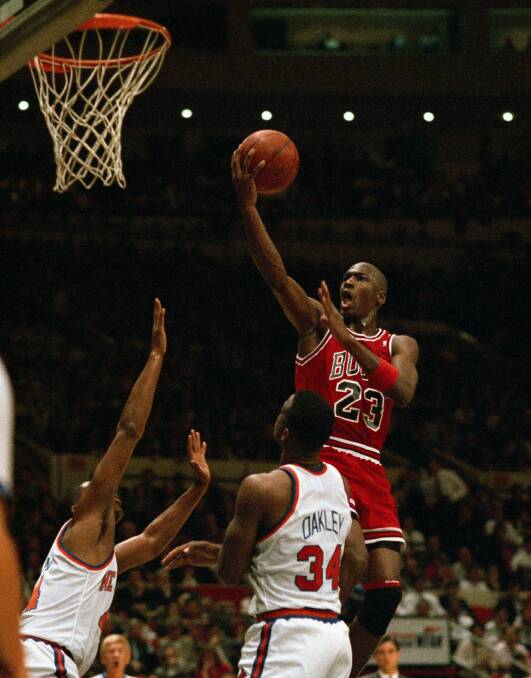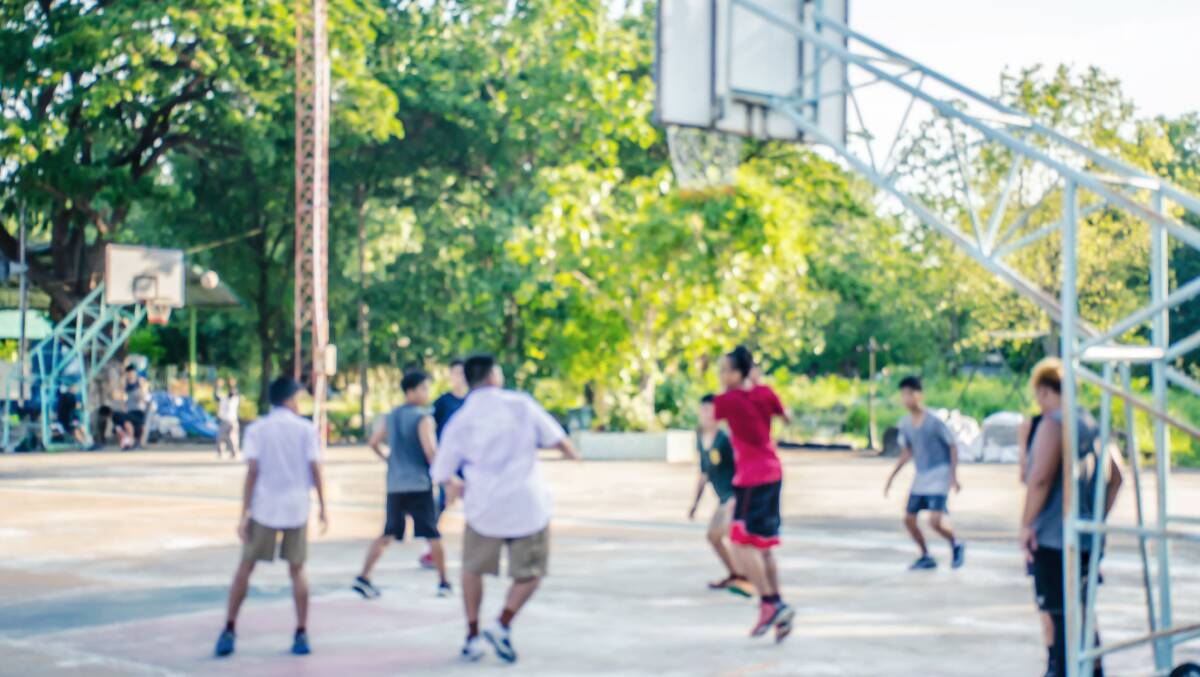
As strange as this sounds, I found myself holding back tears when the credits rolled at the end of ESPN's most viewed documentary ever, The Last Dance.
Subscribe now for unlimited access.
or signup to continue reading
Like many basketball players and fans who became engrossed with the documentary during the COVID-19 lockdown, watching The Last Dance offered me an escape. Backwards in time, hoops style, to when Michael Jordan still flew through the air for dunk after dunk, and the Chicago Bulls earned the NBA's respect with six championships during the 1990s. When the pandemic restrictions were in full force, you couldn't play basketball with your mates, but you could sure as hell relive the glamorous drama of Jordan leading the Bulls to their final shot at glory before the team was disbanded forever.
Jordan still looms so large in the world of basketball and beyond not just because he was a sublimely talented player, with one of the most successful careers in the history of the game, but also because he was intensely competitive. He made the sport itself more popular. A well-marketed shoe brand, clothing line and a gold medal win at the Barcelona Olympics helped sell the idea that players across the world might, just one day, be like Mike on the court.
But despite Jordan's fame, his playing did most of the talking, and hearing him open up during The Last Dance made it even more fascinating. NBA players didn't chat on Twitter and other social media in the '90s like they do now. Such candid, revealing observations from a normally reserved Jordan felt almost shocking in this online era.
While The Last Dance was so compelling, it wasn't until the morning after the final episode dropped that I realised why I felt so sad. As I huffed and puffed my way across an outdoor basketball court, far away from the bright lights and superstars of the NBA, and in Canberra's biting cold, no one else but me rebounded my wobbly shots. I couldn't give anyone a high five. No cheers of encouragement filled the air, only the harsh rattle of wood and metal when my ball hit the backboard.
The distraction of watching The Last Dance had briefly delayed another miserable week of playing basketball without my team, my friends, and relieved that disturbing, persistent feeling of being utterly alone.
The story of the '90s Chicago Bulls resonates with me for how they stuck together during some of the toughest moments of their lives.
I wasn't the only basketballer trying to stay safe from infection and still hit the courts. Riding my bicycle home, I often saw others: like the steadfast mum carefully collecting and firing back the ball to her teenage son dutifully practising his free-throw shots. The middle-aged man and his passionate but haphazard dribbling past imaginary opponents to the basket. And then there was the couple, drenched in sweat, perhaps working out their stay-at-home stress with a bout of one-on-one.
Not being able to play local team sports due to social distancing measures meant missing the joy of playing with others, and that visceral, physical feeling of being part of something more than yourself.
Of course, spending 30 minutes running around a court on a fast break or trying to steal a loose ball helps basic aerobic fitness, and reduces the risks of chronic health conditions like diabetes and heart disease.
Working up a sweat can also release tension from a stressful day spent hunched over a work computer. People start to feel more confident and sure of themselves when supported emotionally by a team. If there are targeted programs in local clubs addressing issues with alcohol and other drugs, they help reduce drink driving, excessive alcohol consumption and other risky behaviours.
READ MORE:
Taking out the rock with fellow ballers is not just about physical health, though. Studies also find though that a sense of belonging in a team, that feeling of being accepted by a group of people with a shared purpose, even if it's just for the fun of sinking a few baskets, is important. When life becomes very uncertain due to unemployment, difficulties at school, relationship issues and similar challenges, the stability of turning up each week to play can be the anchor that helps some people survive.
The modification of team sports helps to change the conditions of life so that it is more inclusive as well. Wheelchair basketball games provide an opportunity for those with spinal cord injuries to keep playing. For people who have arrived as refugees, sports are an entry point that can help them participate in the rest of community life, and a chance for local clubs to better engage with our diverse Australian population.
Right now, I'm one of the lucky ones. My pay cheque is steady. I live with my wife in a home that is safe, and just a short ride away from a free basketball court where there is no entry fee.
What is painful, however, is knowing that before the pandemic, I took playing with a basketball team for granted. That on Thursday nights, at a social league in Canberra's north, I could lace up my boots, and join the men and women of the Birds, as we call ourselves, and simply enjoy shooting hoops together. Without fear of getting sick. Of infecting others. And being able to just hang out and help sustain life, rather than risk it.

In The Last Dance, a young Michael Jordan explains why playing with the Chicago Bulls team mattered so much to him: "I just want the franchise and the Chicago Bulls to be respected," Jordan says, determined, and hopeful. "Like the Lakers, the Philadelphia 76ers or the Boston Celtics. Hopefully this team, this organisation, can build a program like that."
At 176 centimetres tall with boots on, and in my early 40s, I will never experience the kinds of pressures that Jordan and his ilk face in creating a legacy of respect for sporting excellence. Yet the story of the '90s Chicago Bulls resonates with me for how they stuck together during some of the toughest moments of their lives. The ease and importance of having relationships with others through basketball, and many other areas of my life, are what I have more respect for now that those relationships have been harder to maintain.
Luckily, the social distancing restrictions are beginning to lift in Australia. Basketball ACT just reopened competition registrations, and my social league has let players know they are working with their venues to try and get us playing again as soon as possible. At long last, the lights will turn on again in many of the basketball stadiums across Canberra. Hopefully another outbreak won't turn the lights off again.
Finally, I will get a chance to sink some more buckets with the Birds. And when I do make it back onto the court, I won't forget how precious that time with my mates is.
- Ben O'Mara is a writer based in Canberra and Melbourne.

